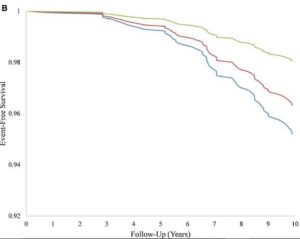I’m on the visionary panel. To register, click here.

Two studies suggest—but most definitely do not prove—that they might.
A press release from Boston University says that daily consumption of either sugary or artificially sweetened drinks affect the brain.
Data from the Framingham Heart Study (FHS) has shown that people who more frequently consume sugary beverages such as sodas and fruit juices are more likely to have poorer memory, smaller overall brain volumes and smaller hippocampal volumes–an area of the brain important for memory. Researchers also found that people who drank diet soda daily were almost three times as likely to develop stroke and dementia when compared to those who did not consume diet soda.
The American Heart Association sent out its own press release on the stroke and dementia results.
Framingham study participants who reported drinking one or more artificially sweetened beverage daily compared to less than one a week had almost three times the risk of developing either stroke or dementia.
The data are impressive. This is the survival curve for dementia (the one for stroke looks much the same). Green = 0 drinks per week. Red = 6 per week. Blue = 7 or more per week.

Caveat: These are correlational studies showing an association between sweet drinks and loss of brain function. They do not demonstrate that sweet drinks cause these problems—these could be due to some other dietary or behavioral factor.
As you might imagine, the studies got as lot of press attention. One useful analysis comes from Business Insider:
First, both studies were done by some of the same researchers, including the lead scientist, Boston University neurologist Matthew Pase…For the sweet drinks and brain health research, the scientists drew from a large set of observational data taken from thousands of people from the town of Framingham, Massachusetts who were initially recruited beginning back in the 1940s as part of a study designed to learn more about heart disease called the Framingham Heart Study…of all the people in the study, the percentage of those who did go on to develop stroke or dementia was small — about 3% for stroke and about 5% for dementia.
The Guardian asks “Should link between dementia and artificial sweeteners be taken with a pinch of salt?” It discusses some of the methodological issues, of which there are many.
The bottom line? While waiting for researchers to sort all this out, water is an excellent choice.
Sugary drinks study
Diet drinks study